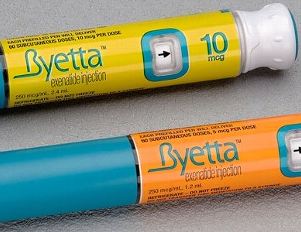 Type-2 diabetes medication Byetta (exenatide) has become a highly criticized treatment. Patients who allege developing pancreatic cancer or having kidney failure after taking Byetta argue that the U.S. Food and Drug Administration has not ensured the safety of patients utilizing this risky medicine. So what exactly has the FDA done in the few years of Byettas existence?
Type-2 diabetes medication Byetta (exenatide) has become a highly criticized treatment. Patients who allege developing pancreatic cancer or having kidney failure after taking Byetta argue that the U.S. Food and Drug Administration has not ensured the safety of patients utilizing this risky medicine. So what exactly has the FDA done in the few years of Byettas existence?
In June 30, 2004, Amylin Pharmaceuticals and Eli Lilly & Co. submitted a new drug application to the U.S. Food and Drug Administration for exenatide which was accepted several months later in September that year. After reviewing exenatide, the FDA granted approval of the brand name form Byetta on April 28, 2005 as an injection treatment for type-2 diabetes.
Doctors soon found hope in implementing Byetta in combination with insulin glargine to assist patients with type-2 diabetes who had been unsuccessfully treated with glargine. Clinical trials demonstrated that patients who had used Byetta along with insulin glargine had more stable glycemic levels than those who had only received glargine. In October of 2011, the FDA approved Byetta for cocurrent use with insulin glargine in the United States. By November 2, 2009, Byetta was approved for expanded use to be implemented as a first-line treatment for type-2 diabetes.
However, the U.S. Food and Drug Administration has not been oblivious to the safety hazards of Byetta. The FDA issued a handful of warnings and cautionary notices regarding Byetta injections over the years. Since its approval, the FDA has been notified of 40 cases of pancreatitis, 21 hospitilizations, and 6 deaths associated with use of Byetta. After receiving initial reports of panreatitis on October 30, 2009, the FDA instructed Eli Lilly & Co. to adjust warning labels to highlight the risks of acute panreatitis while taking Byetta.
In 2008 the FDA released additional information concerning Byetta’s adverse reactions of necrotizing and hemorrhagic pancreatitis. The notification warned healthcare professionals and providers of these side effects, claiming that of the cases, 6 had resulted in hospitilization. The FDA encouraged doctors to inform patients of these risks and terminate use of Byetta if pancreatitis is suspected.
The FDA issued its latest update on November 2, 2009. The announcement added renal (kidney) impairment and failure to the lengthy list of adverse reactions of Byetta (exenatide). According to investigations, the FDA had received reports of 78 cases of kidney problems between the three and a half year span from April 2005 to October 2008.
Byetta is still under examination by the FDA and other medical experts. Many have filed lawsuits against Amylin Pharmaceuticals and Eli Lilly & Co. regarding serious side effects of pancreatitis and kidney failure related to use of Byetta which victims feel they were inadequately warned about. If you or a loved one has experienced adverse reactions from receiving Byetta (exenatide), fill out the “Request Attorney Assistance” form at the upper-right section of this page to get legal help from our attorneys today.
0."/>